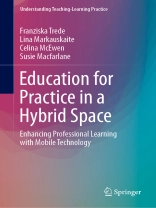This book presents a mobile technology capacity building framework that offers academics, students, and practitioners involved in workplace education a deeper understanding of, and practical guidance on, how mobile technology can enhance professional learning. Approaching professional and workplace learning as a hybrid space in which work, learning and technology meet, the book discusses the value of mobile technology in shaping professional education, particularly during student placements.
The framework focuses on staying professional and safe, considering issues of time and place, planning learning activities, initiating dialogue, networking, creating learning opportunities on-the-go, and deepening reflection. It is designed to assist students and their educators to use mobile technology knowledgeably and responsibly, and to help bridge the gap between university learning and workplace practice.
This book also contributes to a better understanding of the interconnectedness between learning, practice and technology. It demonstrates how to enhance learning and working with mobile technology by drawing on two perspectives: the ‘professional-plus’ and the ‘deliberate professional’.
Spis treści
Part 1 Conceptual framing of mobile technology-enhanced workplace.- 1 Setting the scene: Professional learning in a hybrid space.- 2 Workplace learning as a hybrid space.- 3 m Learning in workplace learning.- 4 Designing a mobile technology capacity building framework for workplace learning.- Part 2 Mobile technology capacity building resources for workplace learning.- 5 Staying professional and safe.- 6 Considering issues of time and place.- 7 Planning learning activities.- 8 Initiating dialogue.- 9 Networking.- 10 Creating learning opportunities on-the-go.- 11 Deepening the reflection.- Part 3 Extending professional learning and practice through mobile technology.- 12 Epistemic fluency and mobile technology: A professional-plus perspective.- 13 Learning to be a deliberate professional in the mobile age.- 14 Fostering agency to enhance learning and working with mobile technology.
O autorze
Franziska Trede is an Associate Professor of Higher Education and Professional Practice at the Institute for Interactive Media and Learning, University of Technology Sydney. Her research primarily focuses on professional practice, professional identity development, social justice, agency, and arts-based methodologies. She recently co-edited (with Celina Mc Ewen) the book
Educating the deliberate professional: Preparing for future practices.
Lina Markauskaite is an Associate Professor and Co-director of the Centre for Research on Learning and Innovation, The University of Sydney. Her primary research focus is on understanding the nature of knowledge work and learning by analysing the capacities needed to solve novel, complex problems in contemporary interdisciplinary contexts. She recently published the book
Epistemic Fluency and
Professional Education: Innovation, Knowledgeable Action and Actionable Knowledge (with Peter Goodyear).
Susie Macfarlane is a Senior Lecturer in Learning Futures at Deakin University, where she leads a team transforming teaching and assessment in the Faculty of Health. Her main research interests are in academic identity; inclusive, video and dialogic feedback; and sessional staff professional development. She is currently completing her Ph D on evaluative judgement at the Centre for Assessment and Digital Learning, Deakin University.
Celina Mc Ewen is a researcher in the sociology and anthropology of education at the University of Technology Sydney. Her work spans the fields of professional, higher, and community education. In collaboration with Franziska Trede, she has developed the concept of the ‘deliberate professional’ and its associated ‘pedagogy of deliberateness’ as a way of reconciling critical thinking, participation and responsibility in professional practice and professional education.











![Pokrywa [奥]阿德勒: 自卑与超越 Pokrywa [奥]阿德勒: 自卑与超越](https://static.worldofdigitals.com/thumb_webp/509/9787569513509.webp)
